Przez lata wielu naszych użytkowników pytało nas, jak usuwać niechciane dane z baz danych WordPress. Dane te mogą gromadzić się jak śmieci w nieuporządkowanej szafie. Wiesz, że tam są, ale radzenie sobie z nimi może być przytłaczające.
Zagracona baza danych WordPress może spowolnić twoją witrynę internetową, frustrując odwiedzających i tracąc sprzedaż. Właśnie dlatego utrzymanie bazy danych WordPress w czystości i optymalizacja jest bardzo ważna dla wydajności twojej witryny internetowej.
W WPBeginner regularnie optymalizujemy naszą bazę danych WordPress i pomagamy naszym użytkownikom robić to samo. Z naszego doświadczenia wynika, że najłatwiej jest zacząć od darmowej wtyczki do bazy danych WP-Optimize. Lub, jeśli wolisz nie zajmować się tym samodzielnie, możesz skorzystać z naszej usługi konserwacji WordPress.
Tak więc, jeśli jesteś gotowy, aby poprawić wydajność twojej witryny, pokażemy ci, jak wyczyścić i zoptymalizować bazę danych WordPress. Dzięki temu twoja witryna będzie działać płynnie i wydajnie.
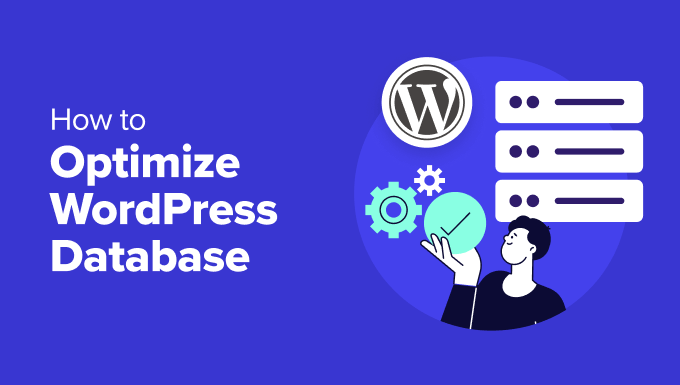
Dlaczego warto oczyścić i zoptymalizować twoją bazę danych WordPress?
Jeśli korzystasz z WordPressa od jakiegoś czasu, to prawdopodobnie w twojej bazie danych znajduje się wiele bezużytecznych danych, takich jak wersje wpisów, komentarze spamowe, kosze, opcje przejściowe, osierocone metadane i tak dalej.
Dane te zwiększają rozmiar twojej bazy danych WordPress, co oznacza, że kopie zapasowe WordPress zajmą więcej miejsca na dysku i czasu na przywrócenie.
Usuwanie i czyszczenie tych niechcianych danych znacznie zmniejsza rozmiar twojej bazy danych WordPress. Doprowadzi to do szybszego tworzenia kopii zapasowych, łatwiejszego przywracania i poprawy wydajności bazy danych.
Poza tym możesz również zoptymalizować bazę danych WordPress, kompresując obrazki, minimalizując pliki JavaScript i CSS oraz konfigurując pamięć podręczna na twojej witrynie. To jeszcze bardziej poprawi wydajność twojej witryny i pomoże zapewnić odwiedzającym szybkie wrażenia użytkownika.
Pro Tip: Przed czyszczeniem i optymalizacją bazy danych zalecamy najpierw utworzenie pełnej kopii zapasowej witryny WordPress. Zmiany wprowadzone przez wtyczkę czyszczącą są nieodwracalne. W ten sposób możesz łatwo przywrócić twoją witrynę, jeśli coś pójdzie nie tak.
To powiedziawszy, przyjrzyjmy się, jak możesz zoptymalizować swoją bazę danych WordPress.
Film instruktażowy
Jeśli nie podoba Ci się film lub potrzebujesz więcej instrukcji, czytaj dalej.
Jak zoptymalizować i wyczyścić twoją bazę danych WordPress jednym kliknięciem?
Najprostszym sposobem na oczyszczenie i zoptymalizowanie twojej bazy danych WordPress jest użycie wtyczki WP-Optimize.
WP-Optimize to popularna wtyczka do pamięci podręcznej i optymalizacji, której celem jest poprawa szybkości i wydajności twojej witryny internetowej. Potrafi ona czyścić bazę danych, kompresować obrazy, usuwać nieużywane rozmiary obrazków, buforować twoją treść i zmniejszać rozmiar plików HTML, CSS i JavaScript.
Ta wtyczka została stworzona przez ten sam zespół, który stoi za popularną wtyczką do tworzenia kopii zapasowych WordPress, UpdraftPlus. Aby dowiedzieć się więcej, zobacz naszą szczegółową recenzję WP-Optimize.
W tym poradniku będziemy używać darmowej wersji WP-Optimize. Istnieje również wersja premium, która oferuje więcej funkcji, takich jak optymalizacja harmonogramu, obsługa WP-CLI, leniwe wczytywanie, pomoc techniczna premium i wiele innych.
Pierwszą rzeczą, którą musisz zrobić, jest zainstalowanie i włączanie wtyczki WP-Optimize. Aby uzyskać więcej informacji, zapoznaj się z naszym przewodnikiem krok po kroku, jak zainstalować wtyczkę WordPress.
Po włączaniu można przejść do strony WP-Optimize ” Baza danych z kokpitu WordPress. Następnie pojawią się różne zadania, które można wybrać do optymalizacji i czyszczenia.
Można na przykład zoptymalizować tabele bazy danych, wyczyścić wszystkie wersje wpisów, wyczyścić wszystkie wpisy z automatyczną wersją roboczą, usuwać spam i zaśmiecone komentarze i wiele więcej.
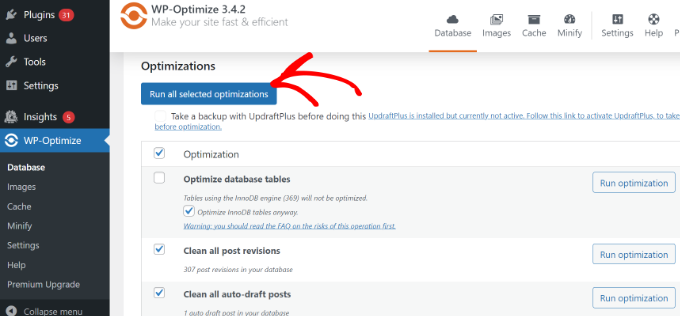
Po wybraniu różnych opcji, kliknij przycisk “Uruchom wszystkie wybrane optymalizacje” u góry.
Wtyczka rozpocznie teraz optymalizację twojej bazy danych WordPress i pokaże ci postęp.
Następnie możesz przejść do karty “Tabele” w WP-Optimize.
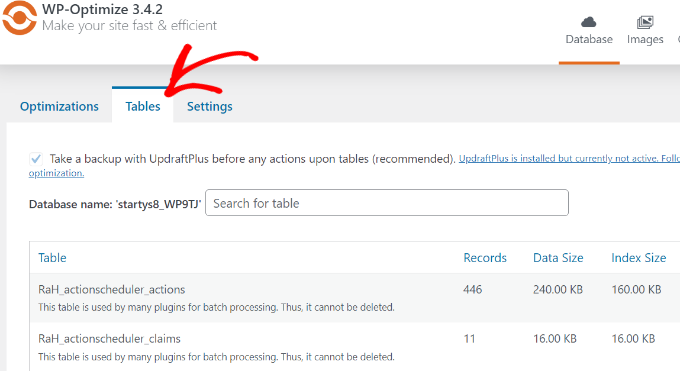
Wtyczka pokaże różne tabele, które są nieaktywne w bazie danych.
Możesz usuwać te tabele, aby zwolnić trochę miejsca i jeszcze bardziej zoptymalizować twoją witrynę.
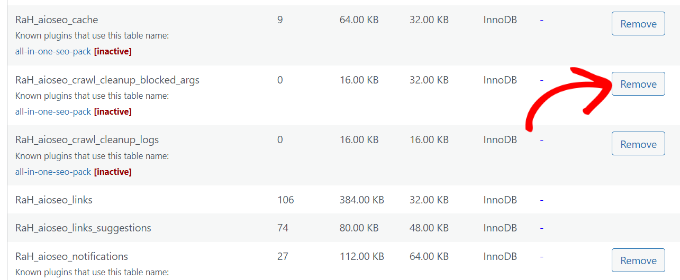
Na koniec można przejść do karty “Ustawienia” i wybrać liczbę tygodni przechowywania danych.
Istnieje również opcja włączania zaplanowanego czyszczenia bazy danych. Można zaplanować codzienne, cotygodniowe, dwutygodniowe lub comiesięczne czyszczenie.
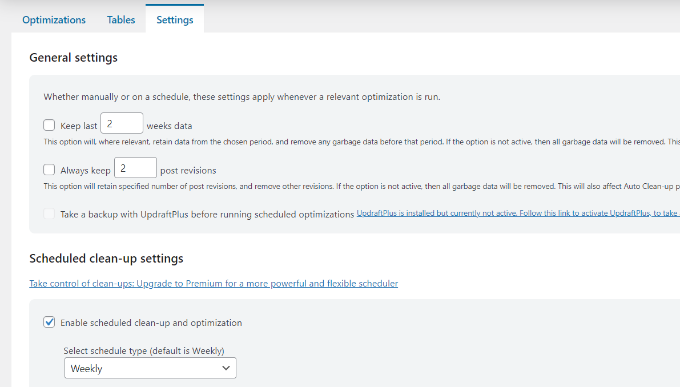
To wszystko. Pomyślnie zoptymalizowałeś i wyczyściłeś swoją bazę danych WordPress!
Dodatkowe funkcje optymalizacji w WP-Optimize
Istnieją inne dodatkowe funkcje oferowane przez WP-Optimize, które również mogą pomóc w optymalizacji twojej bazy danych.
Przyjrzyjmy się im szczegółowo.
Optymalizacja twoich obrazków
Jeśli przejdziesz do karty “Images” lub przejdziesz do WP-Optimize ” Images z panelu administracyjnego WordPress, znajdziesz opcje kompresji obrazków na twojej witrynie.
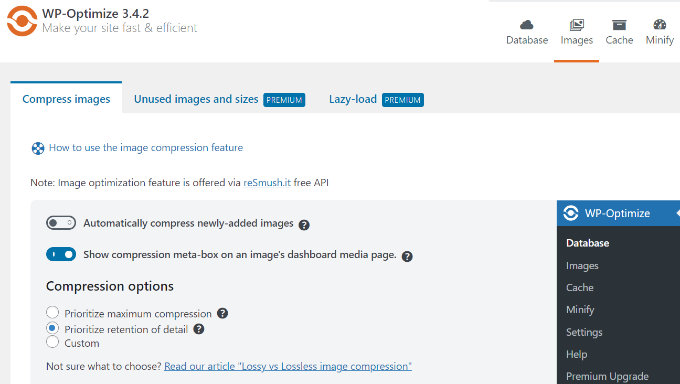
WP-Optimize będzie również automatycznie konwertować obrazki JPG i PNG do formatu WebP i serwować tę wersję, gdy tylko będzie to możliwe.
Może to skutkować znacznie mniejszymi plikami i pomóc w optymalizacji baz danych WordPress.
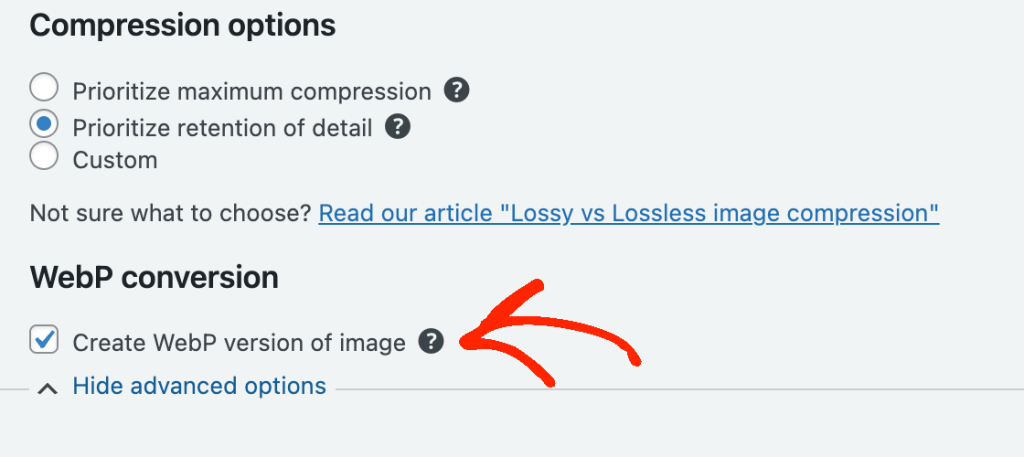
Warto również zapoznać się z naszym przewodnikiem na temat łatwej optymalizacji obrazków bez utraty jakości.
Włącz pamięć podręczna strony
Wtyczka oferuje również opcję włączania pamięci podręcznej strony.
Może to poprawić szybkość i wydajność twojej witryny poprzez przechowywanie kopii treści na serwerze. Serwer może następnie po prostu wyświetlić tę kopię odwiedzającym, zamiast pobierać ją od zera.
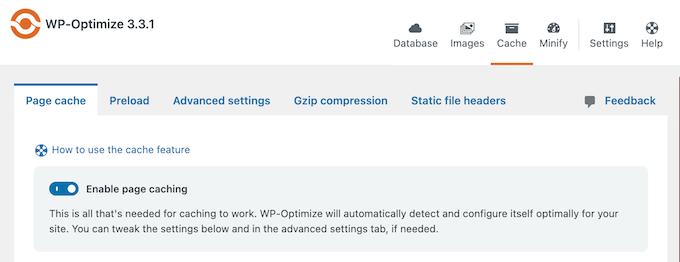
WP-Optimize pozwala również na zmianę ustawień pamięci podręcznej.
Możesz dostarczać różne treści w zależności od roli użytkownika, urządzenia i tego, czy aktualnie się loguje.
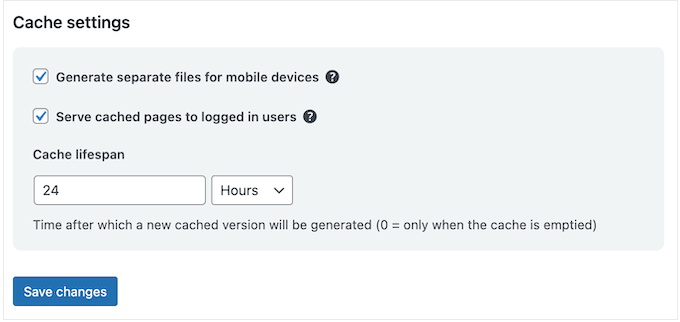
Zminimalizuj pliki HTML, CSS i JavaScript
Innym sposobem na oczyszczenie i optymalizację twojej bazy danych WordPress jest włączenie minifikacji.
Usuwa białe spacje, linie i niepotrzebne znaki z kodu źródłowego. Dzięki temu twoje pliki WordPress CSS i JavaScript wczytują się szybciej.
Wystarczy przejść do karty Minify w WP-Optimize, a następnie kliknąć opcję “Włącz Minify”.
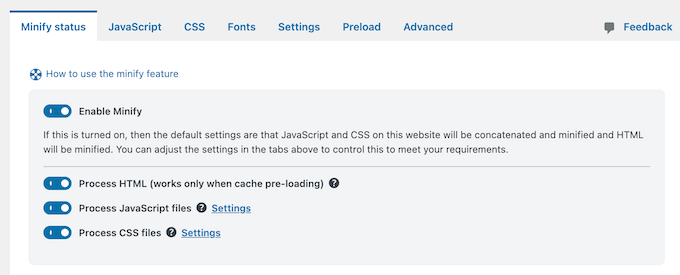
Wtyczka automatycznie zajmie się procesem minifikacji, ale możesz dostosować ustawienia i dostosować, które pliki CSS i JavaScript mają zostać wykluczone.
Alternatywa dla WP-Optimize: Jeśli szukasz alternatywnej opcji czyszczenia bazy danych, to możesz również skorzystać z wtyczki WP-Sweep. Jest ona całkowicie darmowa i wykorzystuje wszystkie odpowiednie funkcje usunięcia WordPressa do czyszczenia bazy danych. Brakuje jej jednak opcji optymalizacji, które można uzyskać w WP-Optimize.
Bonus: Zatrudnij ekspertów do optymalizacji twojej bazy danych WordPress
Jeśli optymalizacja bazy danych WordPress jest dla ciebie zbyt czasochłonna lub techniczna, rozważ zatrudnienie agencji pomocy technicznej WordPress, która zajmie się wszystkimi twoimi potrzebami związanymi z obsługą bazy danych WordPress.
Na rynku dostępnych jest wiele usług utrzymania WordPress, ale my polecamy nasze przystępne cenowo usługi utrzymania i pomocy technicznej WordPress.
Możemy zająć się wszystkim, co jest związane z podstawową obsługą bazy danych WordPress dla twojej witryny internetowej, w tym monitorowaniem dostępności 24/7, poprawkami błędów bazy danych, optymalizacją witryny pod kątem wydajności, czyszczeniem bazy danych i nie tylko.

Oferujemy również awaryjną pomoc techniczną WordPress, aby szybko i niezawodnie rozwiązać jednorazowe problemy na twojej witrynie internetowej, w tym rozdętą bazę danych. Możemy również poprawić ciągi połączeń bazy danych WordPress, błędy wtyczek, niedziałające odnośniki i wiele więcej.
Poza tym do wyboru jest więcej usług Pro. Możesz naprawić zhakowaną witrynę, zoptymalizować witrynę pod kątem szybkości, zwiększyć ruch organiczny dzięki optymalizacji SEO i nie tylko.
Po prostu zobacz naszą pełną listę usług WPBeginner Pro, aby uzyskać więcej szczegółów.
Pomocne zasoby dla optymalizacji bazy danych WordPress
Mamy nadzieję, że ten artykuł pomógł ci dowiedzieć się, jak wyczyścić i zoptymalizować twoją bazę danych WordPress. Możesz również zapoznać się z innymi przewodnikami i pomocnymi poradnikami, aby upewnić się, że twoja baza danych WordPress działa płynnie i bez żadnych błędów:
- Jak naprawić błąd “WordPress Database Error Disk Full”?
- Jak ręcznie wykonać kopię zapasową bazy danych WordPress (krok po kroku)
- Jak zresetować twoją bazę danych WordPress do ustawień domyślnych?
- Jak zduplikować bazę danych WordPress za pomocą phpMyAdmin
- Najlepsze wtyczki do bazy danych WordPress – wybór ekspertów
- Jak naprawiono błąd nawiązywania połączenia z bazą danych w WordPress?
- Konserwacja WordPressa – przewodnik dla początkujących
If you liked this article, then please subscribe to our YouTube Channel for WordPress video tutorials. You can also find us on Twitter and Facebook.





Usman
Is it necessary to take a backup first then Optimize the Database?
WPBeginner Support
While not necessary, we strongly recommend it on the off chance something goes wrong or you run into an error. While it is rare for that to happen, it is better to be safe
Admin
Nikita Shevchenko
Hello! Great article! I have one question. Can I use this plugin simultaneously with autooptimize and wp3 total cache plugins?
Editorial Staff
This is a plugin that you can use and then disable once you’re done cleaning the database. We recommend using this plugin once every 6 – 12 months.
Admin
ANTESH KUMAR SINGH
How to fix “Optimize InnoDB tables anyway” in WP-Optimize plugin?
Have any solution to optimize InnoDB tables in WordPress?
James Finn
Hey guys,
In this article:
/plugins/how-to-clean-up-your-wordpress-database-for-improved-performance/
It is stated:
“… the main [benefit of wp-sweep over wp-optimize] is that it uses proper WordPress delete functions as much as possible instead of running direct delete MySQL queries. Whereas the WP-Optimize plugin uses direct delete SQL queries which can leave orphaned data left behind. In other words, WP-Sweep is a better coded plugin than WP-Optimize.”
Quote and closed quote!
Perhaps you can explain why you have two clearly contradictory articles published on your site at the same time. Edit one, or the other, please!
An incredibly influential site such as this needs more attentive editorial review.
Thanks bunches!
WPBeginner Support
Hi James,
We often recommend plugins that do the same thing. If there is a difference, then we also try to highlight it as you have quoted. One great thing about WordPress is that you often have plenty of excellent solutions for a problem.
Admin
Neal Umphred
You used to recommend WP-Sweep for this service:
(https://www.wpbeginner.com/plugins/how-to-clean-up-your-wordpress-database-for-improved-performance/).
What happened?
WPBeginner Support
Hey Neal,
We still recommend it. You can use either of these two plugins for the job.
Admin
Neal Umphred
Thanks for the response!
If I use WP-Optimize, do I need an occasional clean-up from WP-Sweep?
Ian Spare
In a previous article (https://www.wpbeginner.com/plugins/delete-old-post-revisions-in-wordpress-with-better-delete-revision/) you made an update stating that post revisions would not impact database performance. Are you now saying they do?
Mayank Debnath
Yea! I am confused too ..
Ian Spare
It’s clear that actions like removing post revisions will make no difference whatsoever to “database performance”. I think the confusion is caused by some misunderstanding about how relational databases work and specifically about how indexed queries are executed.
The problem is exacerbated by so many WordPress users being quite certain that optimising their database is required. Given that relations databases and related technologies like Indexed Sequential Access Method (ISAM) on which the internals are based have been around for some 50 years it ought to be well understood.
The entire point of using a database is to access data in a way that scalable. The time it takes to find an indexed record, for example, a published WordPress post, is not dependent on the size of the database.
I’d invite the authors of this article to actually test this. Create a WordPress install and create a few thousand revisions of a post. You’ll find it makes zero difference to performance.
The time it takes to find a post is dependent on the number of seeks it takes. You can work this out like this:
log(row_count) / log(index_block_length / 3 * 2 / (index_length + data_pointer_length)) + 1
I can tell you that the number of seeks will not increase between thousands of revisions and tens of thousands. You’ll get an extra seek when you enter the hundred of thousands of rows. But, the odds are it’s in query cache anyway so it won’t matter.
I know from testing, for no reason at all, that having a post with 200,000 revisions is just as quick to access as one with none.
Matilda Moo
So if my host is saying my sites keep going down because i need to optimise my db, really it’s the number of hits/seeks that my hosting can’t cope with?
Rob Smelik
I can’t speak for the author but thought I would throw some thoughts out there.
When it comes to loading your site on the front end, WordPress is actually smart enough to ignore previous revisions as it loads individual pages. However, overall database bloat can slow down a site if you have a large site with many pages and posts. Post revisions do add to the overall size of a database but are certainly not the only contributor. That being said… anything that you can do to reduce the size of your database will keep your site running at peak performance.
I have been using WP Optimize for years both on personal and client sites and can honestly say it does an excellent job at keeping your database clean. I have also noticed speed boosts when installing on older sites with larger databases that haven’t been optimized. With regard to post revisions, It has a great setting that allows you to limit the number of stored revisions. I keep it set at about 10 which is more than enough for post revision backup purposes.
I believe the premium version of the plugin also lets you schedule optimization cycles without having to manually go in and click the optimize button.
WPBeginner Support
Hi Ian Spare,
Post revisions don’t affect database performance or your site’s page load times. However, they do increase database size. On older websites with lots of content, cleaning up or limiting post revisions can significantly reduce database backup file size. This means you will be to do on-demand backups, restore from backups, or move backup files around a bit faster. It will also save space on your cloud storage service where you save your backups.
Admin
Ian Spare
Thanks, I think you’re moving closer to an accurate position now.
I think we can dismiss size considerations pretty quickly. A MySQL dump of WordPress database is pretty small. It’s highly compressible data as well, I’d suggest as pure text with a midrange compressional level you’d get around 10:1.
So I suggest this site might have 1000 posts with 10 revisions per post which for some (unlikely) reason are all the same size (in practice, they’ll be smaller you’d think). And we’ll say a post is about 2800 characters in size because that’s around the size of your post here, we’ll add a bit because it’s not going to make a lot of difference and say 3000 chars.
1000 * 10 * 3000 = 30000000
or about 28mb which is going to be around 2.8mb in compressed size.
Which is, in technical terms, diddly squat. A handful of images at best.
The footprint of an average WordPress post is very often the associated images. They’ll need backing up as well. That footprint will only be trivially impacted by the number of revisions.
There’s not a realistic chance these backups will fit into, for example, the free cloud storage of 2gb on Dropbox. So, anyone storing backups in the cloud might well have paid for a service which will be delivering unlimited storage (ie the jetpack backup service) or terabytes.
It’s hardly a realistic concern to be bothered about a couple of mb in size for a backup file. I appreciate there’ll be some who’ll produce a contrived use case where 10k makes a difference which is fine, I’m just saying in general usage, this is nothing.